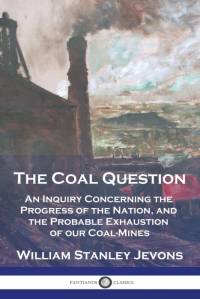The Coal Question
- Indbinding:
- Paperback
- Sideantal:
- 172
- Udgivet:
- 1. januar 1866
- Størrelse:
- 152x10x229 mm.
- Vægt:
- 259 g.
- 2-4 uger.
- 8. maj 2025
På lager
Normalpris
Abonnementspris
- Rabat på køb af fysiske bøger
- 1 valgfrit digitalt ugeblad
- 20 timers lytning og læsning
- Adgang til 70.000+ titler
- Ingen binding
Abonnementet koster 75 kr./md.
Ingen binding og kan opsiges når som helst.
- 1 valgfrit digitalt ugeblad
- 20 timers lytning og læsning
- Adgang til 70.000+ titler
- Ingen binding
Abonnementet koster 75 kr./md.
Ingen binding og kan opsiges når som helst.
Beskrivelse af The Coal Question
William Stanley Jevons seeks to demonstrate how the supply of coal - a finite source of energy - is unsustainable, while being heavily relied upon by industrialized economies.
The Coal Question is considered the earliest work to discuss extensively the problem of energy resource depletion in an industrialized world. Writing in 1865, the author discusses how ready supplies of coal present in the British Isles is forecast to deplete in the forthcoming decades. The rise of the United States, which surpassed British energy production in 1913, was also predicted by Jevons based on the data he had available on American geology. He notes undesirable side effects of coal burning, most notably air pollution, but laments that curtailment is unlikely without deep societal reform.
Jevons' predictions of coal depletion in the British Isles were accompanied by his famous paradox; that increasing efficiency when burning coal does not reduce consumption, but instead induces an increase in demand - the net result being that more, rather than less, coal is consumed over a given period. Jevons' Paradox remains a hotly discussed topic in economics; today, it is applied to gasoline, jet fuel and other energy commodities. It is commonly cited by modern economists discussing the energy transition from fossil fuel to renewable sources, plus conservationism in general.
The Coal Question is considered the earliest work to discuss extensively the problem of energy resource depletion in an industrialized world. Writing in 1865, the author discusses how ready supplies of coal present in the British Isles is forecast to deplete in the forthcoming decades. The rise of the United States, which surpassed British energy production in 1913, was also predicted by Jevons based on the data he had available on American geology. He notes undesirable side effects of coal burning, most notably air pollution, but laments that curtailment is unlikely without deep societal reform.
Jevons' predictions of coal depletion in the British Isles were accompanied by his famous paradox; that increasing efficiency when burning coal does not reduce consumption, but instead induces an increase in demand - the net result being that more, rather than less, coal is consumed over a given period. Jevons' Paradox remains a hotly discussed topic in economics; today, it is applied to gasoline, jet fuel and other energy commodities. It is commonly cited by modern economists discussing the energy transition from fossil fuel to renewable sources, plus conservationism in general.
Brugerbedømmelser af The Coal Question
Giv din bedømmelse
For at bedømme denne bog, skal du være logget ind.
Find lignende bøger
Bogen The Coal Question findes i følgende kategorier:











